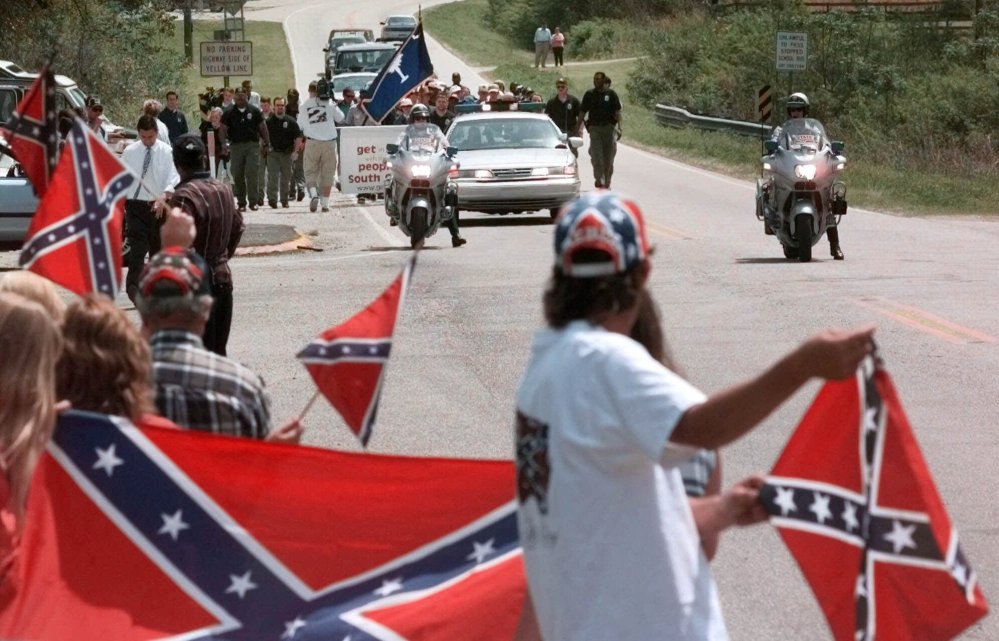Even as national retailers pull Confederate flags from shelves and websites after the shooting deaths of nine black church members in South Carolina, manufacturers that produce the divisive symbol say that sales are now surging.
“I don’t sell the Confederate flag for any specific group, I just sell the flag,” said Kerry McCoy, owner and president of Arkansas’ FlagandBanner.com. “This is America. Everybody has a right to be represented whether you are a history buff or a nut.”
McCoy said her company expects to sell about 50 of the flags over the next week. That’s about half of what they typically sell in a year.
Amazon, Sears, eBay and Etsy said Tuesday that they would remove Confederate flag merchandise from their websites. Sears does not sell the merchandise inside Sears or Kmart stores. Target said it pulled its historic Confederate costume from its web site, but said it did not carry Confederate flags or decor that bore that image.
Google, meanwhile, blocked digital ads featuring Confederate flags after concluding they violated the Internet company’s policy against marketing messages promoting content that could be “generally perceived” as an expression of hate toward a group of people. The ban included Google Shopping, which consists of merchant ads. Links to Confederate flags are still being shown in Google’s general search results.
The wave of merchandise bans came a day after Wal-Mart Stores Inc. said that it would remove all Confederate-themed items from its store shelves and website after the South Carolina shooting suspect, Dylann Storm Roof, appeared in photos holding the flag.
Other national retailers say they do not sell, or never have sold, Confederate items.
While the Confederate flag represents a small slice of their business, some of those that produce them say they have no plans to stop.
Pete Van de Putte said sales of Confederate flags are surging at his Dixie Flag Manufacturing in San Antonio, Texas. He said he has sold more flags in the last couple days than they would have typically sold over a couple of months.
“Any time there is a controversy about any flag, we sell more flags,” he said. “It’s not like selling tires or washing machines.
Both Van de Putte and McCoy say American flags are their most popular products. McCoy said most of the Confederate flags she sells are lower-quality items not meant to fly outside every day. She said residents of California easily buy the most of any state.
“They’re more for a dorm room or a gag gift,” she said. “I don’t know anybody that flies the Confederate battle flag on their flag pole outside their business. I mean, who would do that?”
Van de Putte’s inventory also includes novelty flags and banners from the military and countries like North Korea. He estimates that nearly every flag in his store could be seen as objectionable by someone.
Likewise, McCoy said she frequently gets pressure she resists to stop making gay pride flags or even flags that represent political parties.
“I’m not here to judge who does what with their flag, I’m just here to provide for America,” McCoy said.
But The Valley Forge Flag Co., based in Wyomissing, Pennsylvania, will no longer manufacture the Confederate battle flag. It is pulling references to it from its website and telling managers at its manufacturing plants, located in South Carolina and Alabama, to cancel pending orders.
“When you have a sea change moment like you have with the tragedy in Charleston, we felt it was simply the right thing to do,” Valley Forge Vice President Reggie VandenBosch said. “We don’t want to do anything that causes pain or disunity for people.”
VandenBosch, who heads the Flag Manufacturers Association of America, said Valley Forge had long been uncomfortable with making what the flag industry had viewed as a historical artifact.
Copy the Story Link
Send questions/comments to the editors.



Success. Please wait for the page to reload. If the page does not reload within 5 seconds, please refresh the page.
Enter your email and password to access comments.
Hi, to comment on stories you must . This profile is in addition to your subscription and website login.
Already have a commenting profile? .
Invalid username/password.
Please check your email to confirm and complete your registration.
Only subscribers are eligible to post comments. Please subscribe or login first for digital access. Here’s why.
Use the form below to reset your password. When you've submitted your account email, we will send an email with a reset code.